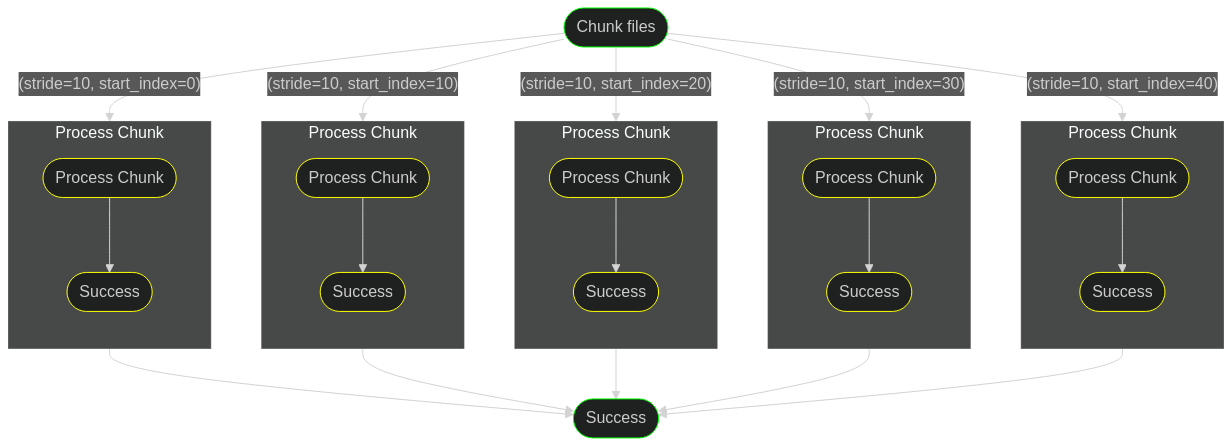Hello from magnus








Magnus is a simplified workflow definition language that helps in:
Along with the developer friendly features, magnus also acts as an interface to production grade concepts
such as data catalog, reproducibility,
experiment tracking
and secure access to secrets.
What does it do?

Documentation
More details about the project and how to use it available here.
Installation
The minimum python version that magnus supports is 3.8
pip install magnus
Please look at the installation guide
for more information.
Example
Your application code. Use pydantic models as DTO.
Assumed to be present at functions.py
from pydantic import BaseModel
class InnerModel(BaseModel):
"""
A pydantic model representing a group of related parameters.
"""
foo: int
bar: str
class Parameter(BaseModel):
"""
A pydantic model representing the parameters of the whole pipeline.
"""
x: int
y: InnerModel
def return_parameter() -> Parameter:
"""
The annotation of the return type of the function is not mandatory
but it is a good practice.
Returns:
Parameter: The parameters that should be used in downstream steps.
"""
return Parameter(x=1, y=InnerModel(foo=10, bar="hello world"))
def display_parameter(x: int, y: InnerModel):
"""
Annotating the arguments of the function is important for
magnus to understand the type of parameters you want.
Input args can be a pydantic model or the individual attributes.
"""
print(x)
print(y)
Application code using driver functions.
The code is runnable without any orchestration framework.
from functions import return_parameter, display_parameter
my_param = return_parameter()
display_parameter(my_param.x, my_param.y)
Orchestration using magnus
| python SDK | yaml |
|---|
Example present at: examples/python-tasks.py
Run it as: python examples/python-tasks.py
from magnus import Pipeline, Task
def main():
step1 = Task(
name="step1",
command="examples.functions.return_parameter",
)
step2 = Task(
name="step2",
command="examples.functions.display_parameter",
terminate_with_success=True,
)
step1 >> step2
pipeline = Pipeline(
start_at=step1,
steps=[step1, step2],
add_terminal_nodes=True,
)
pipeline.execute()
if __name__ == "__main__":
main()
|
Example present at: examples/python-tasks.yaml
Execute via the cli: magnus execute -f examples/python-tasks.yaml
dag:
description: |
This is a simple pipeline that does 3 steps in sequence.
In this example:
1. First step: returns a "parameter" x as a Pydantic model
2. Second step: Consumes that parameter and prints it
This pipeline demonstrates one way to pass small data from one step to another.
start_at: step 1
steps:
step 1:
type: task
command_type: python
command: examples.functions.return_parameter
next: step 2
step 2:
type: task
command_type: python
command: examples.functions.display_parameter
next: success
success:
type: success
fail:
type: fail
|
Transpile to argo workflows
No code change, just change the configuration.
executor:
type: "argo"
config:
image: magnus:demo
persistent_volumes:
- name: magnus-volume
mount_path: /mnt
run_log_store:
type: file-system
config:
log_folder: /mnt/run_log_store
More details can be found in argo configuration.
Execute the code as magnus execute -f examples/python-tasks.yaml -c examples/configs/argo-config.yam
Expand
apiVersion: argoproj.io/v1alpha1
kind: Workflow
metadata:
generateName: magnus-dag-
annotations: {}
labels: {}
spec:
activeDeadlineSeconds: 172800
entrypoint: magnus-dag
podGC:
strategy: OnPodCompletion
retryStrategy:
limit: '0'
retryPolicy: Always
backoff:
duration: '120'
factor: 2
maxDuration: '3600'
serviceAccountName: default-editor
templates:
- name: magnus-dag
failFast: true
dag:
tasks:
- name: step-1-task-uvdp7h
template: step-1-task-uvdp7h
depends: ''
- name: step-2-task-772vg3
template: step-2-task-772vg3
depends: step-1-task-uvdp7h.Succeeded
- name: success-success-igzq2e
template: success-success-igzq2e
depends: step-2-task-772vg3.Succeeded
- name: step-1-task-uvdp7h
container:
image: magnus:demo
command:
- magnus
- execute_single_node
- '{{workflow.parameters.run_id}}'
- step%1
- --log-level
- WARNING
- --file
- examples/python-tasks.yaml
- --config-file
- examples/configs/argo-config.yaml
volumeMounts:
- name: executor-0
mountPath: /mnt
imagePullPolicy: ''
resources:
limits:
memory: 1Gi
cpu: 250m
requests:
memory: 1Gi
cpu: 250m
- name: step-2-task-772vg3
container:
image: magnus:demo
command:
- magnus
- execute_single_node
- '{{workflow.parameters.run_id}}'
- step%2
- --log-level
- WARNING
- --file
- examples/python-tasks.yaml
- --config-file
- examples/configs/argo-config.yaml
volumeMounts:
- name: executor-0
mountPath: /mnt
imagePullPolicy: ''
resources:
limits:
memory: 1Gi
cpu: 250m
requests:
memory: 1Gi
cpu: 250m
- name: success-success-igzq2e
container:
image: magnus:demo
command:
- magnus
- execute_single_node
- '{{workflow.parameters.run_id}}'
- success
- --log-level
- WARNING
- --file
- examples/python-tasks.yaml
- --config-file
- examples/configs/argo-config.yaml
volumeMounts:
- name: executor-0
mountPath: /mnt
imagePullPolicy: ''
resources:
limits:
memory: 1Gi
cpu: 250m
requests:
memory: 1Gi
cpu: 250m
templateDefaults:
activeDeadlineSeconds: 7200
timeout: 10800s
arguments:
parameters:
- name: run_id
value: '{{workflow.uid}}'
volumes:
- name: executor-0
persistentVolumeClaim:
claimName: magnus-volume
Pipelines can be:
Linear
A simple linear pipeline with tasks either
python functions,
notebooks, or shell scripts

Execute branches in parallel

Execute a pipeline over an iterable parameter.

Any nesting of parallel within map and so on.











